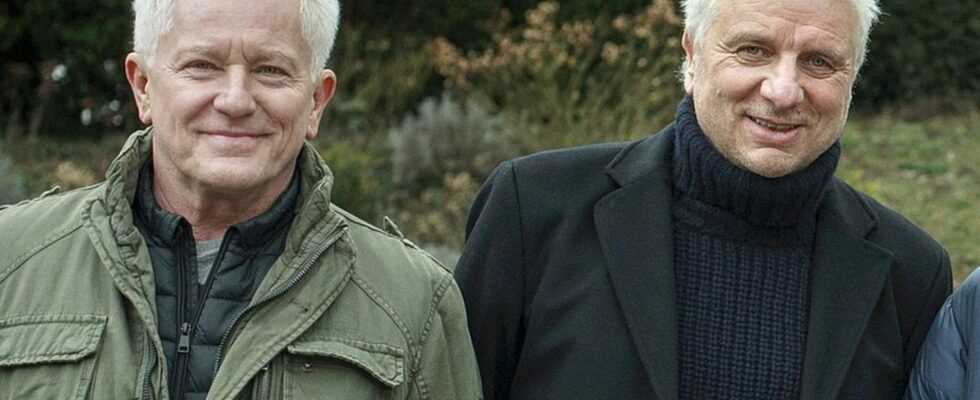What is the "crime scene" recipe for success and how has the crime fiction format changed in 50 years? This is what Udo Wachtveitl and Miroslav Nemec say.
The Munich commissioners Ivo Batic (Miroslav Nemec, 66) and Franz Leitmayr (Udo Wachtveitl, 62) determine together with the Dortmund commissioners in the two interrelated crossover episodes "Tatort: In der Familie" (1 and 2), the next both Sundays (November 29th / December 6th, 8:15 pm, the first). With the actresses Wachtveitl and Nemec ("A Christmas Story"), two stars and real veterans of the crime series are part of the anniversary thriller. They regularly end up in the top 3 in popularity surveys.
After Ulrike Folkerts (59) as Commissioner Lena Odenthal (since 1998), they have been investigating since 1991, making them the second longest in the Sunday crime series. At the top of the podium, the Munich investigators even landed on the number of episodes broadcast – and there is no end in sight. In an interview with the news agency spot on news on the occasion of the big "Tatort" anniversary, the two experts explain what, in their opinion, is the recipe for success of the series and how it has changed over the past decades.
The "Tatort" celebrates its 50th anniversary. Right? Why is there no end in sight?
Miroslav Nemec: That it lasts for so long probably confirms that people like it. Whether this is justified or not is not decided by us, but by the audience. We do it what we believe is best. If people stay true to the format for so long, then such an anniversary will be right.
Udo Wachtveitl: It is probably also due to the fact that the right balance was often struck in the "crime scene". On the one hand the legitimate expectation of the audience to be told an exciting crime thriller. So basically a murder that is solved after 90 minutes, that is the scheme that applies to almost all episodes. On the other hand, this pattern has to be reinterpreted and varied over and over again, the viewer has to be surprised. Reliability and surprise, this balancing act has succeeded relatively often. That's why the audience is inclined to try again next Sunday.
You have been part of the "crime scene" since 1991. How has crime fiction changed since then?
Nemec: Overall, everything has become more qualitative – the editing, the scripts, the dialogues. This is also due to the fact that the viewing habits of the audience have become more demanding.
Wachtveitl: The professionalism on set has definitely increased. The film craft has also improved. I don't want to judge whether this is accompanied by a consistently higher quality of the scripts, I would have to look at a few hundred more "crime scenes". But in any case, the upgrade has changed something for the end devices. Image and sound have become technically much better and more detailed. The larger format has also brought about a change. After all, you have to stage 30 percent more on the left and right, equip more, put more extras.
Nemec: You can see that very well in your own "crime scenes". When I look at a 20-year-old case, for example, the cutting speed, the narrative pulse and, unfortunately, our own game here and there are completely different. It also has to do with the directors who are younger and who do it differently. The cameramen and scriptwriters are also very innovative today. Overall, the quality is simply better. Even in our own game.
Wachtveitl: I have a slightly different opinion. As I said, the level of film craftsmanship has risen and it had to be in order to survive in international competition. But there have been good stories and dialogues before.
Can you remember the first "crime scene" you ever saw?
Wachtveitl: I don't know which one it was. But I know that I was lying on the carpet in front of the TV with my chin propped up and that it was very exciting and great.
Nemec: That was someone with customs investigator Kressin (supra-regional investigation, played by Sieghardt Rupp (1931-2015), A.d.R.)
Wachtveitl: Yes, I still know him.
Which former commissioner has cult status for you?
Nemec: This is Commissioner Finke (investigated in Schleswig-Holstein) alias Klaus Schwarzkopf (1922-1991). It was very good.
Wachtveitl: Stupid that you were faster than me. I would have said Finke too. What I found so special about him: He was very personal without being private. He didn't tell any private antics, almost nothing was known about them. But just the tone of voice, the way he asked a question, everything he could put into one look. That is a worthwhile goal, not to indulge in private affairs and still show one's whole personality.
Nemec: I still have to name Gustl Bayrhammer (1923-1993, investigated as Inspector Veigl in Munich). I knew him personally and Gustl also had this potential as a character.
Wachtveitl: That's right, Gustl had that too.
